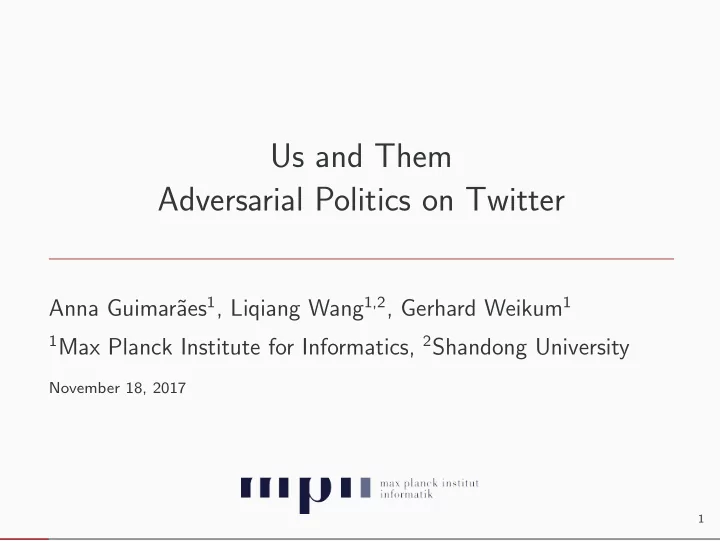

Us and Them Adversarial Politics on Twitter aes 1 , Liqiang Wang 1,2 , Gerhard Weikum 1 Anna Guimar˜ 1 Max Planck Institute for Informatics, 2 Shandong University November 18, 2017 1
2
Donald J. Trump @ realDonaldTrump Certainly has been an interesting 24 hours! RETWEETS LIKES 21,889 61,569 7:48 AM - 8 Oct 2016 3
Donald J. Trump @ realDonaldTrump Certainly has been an interesting 24 hours! RETWEETS LIKES 21,889 61,569 7:48 AM - 8 Oct 2016 User @User - 9 Oct 2016 Replying to @realDonaldTrump Interesting for you, horrifying for the rest of us. Time to give it up. 3
Donald J. Trump @ realDonaldTrump Certainly has been an interesting 24 hours! RETWEETS LIKES 21,889 61,569 7:48 AM - 8 Oct 2016 User @User - 9 Oct 2016 Replying to @realDonaldTrump Interesting for you, horrifying for the rest of us. Time to give it up. AnotherUser @AnotherUser - 9 Oct 2016 Replying to @realDonaldTrump @User You Hillary supporters would love Trump to drop out of the race! That is definitely the ONLY way You will win! 5 more replies 3
This Work • Political adversarial discussions on social media – Initiated by key political figures – Extended over the course of a campaign • Recent prominent cases – 2016 US Election and UK Brexit Referendum • Mining facets of the discussion – Main topics addressed – User roles and attitude towards stakeholders 4
Dataset: US Election and Brexit • Twitter thread rooted on political figures – ‘16 US presidential candidates: Hillary Clinton and Donald Trump – Opposers and supporters of the Brexit referendum: Nicola Sturgeon, Jeremy Corbyn, Nigel Farage and Boris Johnson Stance/Leader Clinton Trump Remain Leave #Posts 2,602 1,861 1,098 539 #Replies 586,335 549,799 101,193 72,190 #Users 153,786 146,255 35,504 27,941 Time Period 01-01-2016 01-02-2016 to 15-11-2016 to 01-10-2016 5
Factual and Post-Factual Topics • Latent topics in the discussions • Topic generation with Twitter-LDA 1 – 20 topics per campaign • Manual labeling with human judges – Semantic label: topic description – Factuality label: factual vs sentimental topics keywords label F/S nhs, health, public, tax welfare F imwithher, vote, love, win pro-Clinton S 1 https://github.com/minghui/Twitter-LDA 6
Topics: Factual 7
Topics: Sentimental 8
Factual and Post-Factual Topics • Predominance of sentimental topics – 56% of replies to Clinton, 61% of replies to Trump – 53% of replies to Remain, 59% of replies to Leave Factual Sentimental 10% 29% social issues contra-Clinton Clinton 9% 16% gun control pro-Clinton 8% 4% foreign politics Bill Clinton 18% 17% republican party contra-Trump Trump 8% 22% foreigners pro-Trump 7% 10% economy media coverage 9
Factual and Post-Factual Topics • Predominance of sentimental topics – 56% of replies to Clinton, 61% of replies to Trump – 53% of replies to Remain, 59% of replies to Leave Factual Sentimental 14% 20% European Union referendum day Leave 11% 18% immigration US parallels 7% 12% foreign politics pro-Leave 15% 30% Scotland pro-labour party Remain 11% 17% social welfare Khan election 7% 10% economy middle east 9
The Power of Users • Activity of different user groups • User inclination: stance – Binary classification with SVM 2 – Each user’s tweets concatenated into a single document – Leaders’ tweets as training data • User roles: regular and power users – Binary classification with SVM 2 – Profile information regarding account activity: creation date, number of posts, number of followees – 100 manually inspected accounts as training data 2 https://www.csie.ntu.edu.tw/ cjlin/libsvm/ 10
The Power of Users • Twice as many pro-Clinton users, but twice as many pro-Trump tweets! – Low activity from Clinton supporters – Five times as many pro-Trump tweets by power users – Pro-Trump tweets appearing frequently among replies to Clinton Pro-Clinton Pro-Trump User type #Users #Tweets #Users #Tweets Power 5,362 25,147 4,851 134,266 Regular 167,927 338,925 81,861 606,505 11
The Power of Users • Twice as many users on the Leave side... – But no significant difference in activity – Power users active for longer periods, and outside the discussion Pro-Leave Pro-Remain User type #Users #Tweets #Users #Tweets Power 1,042 3,529 505 5,991 Regular 42,310 85,455 14,297 77,582 12
Combining Topics and Users • Topical activity of different user groups • In the US case: – Contra-candidate topics were the most popular for regular users – Power users more active in pro-candidate topics, compared to regular users – Regular users more active in factual topics, compared to power users • In the UK case: – Pro-Leave topic received more activity from power users – Referendum day is the most popular topic for most user groups – Remain leaders more active in pro-party topics 13
Conclusions • Adversarial discussions led by political figures on social media • Key insights: – Common themes across different campaigns – Discussions dominated by emotional topics, especially on the winning side – Regular users are more active in critical discussions, power users more active in endorsing parties • Future (and current) work: – Extended dataset covering the aftermath of campaign results – Deeper look into nested discussions and topic evolution – ? 14
Thank You! Anna Guimar˜ aes aguimara@mpi-inf.mpg.de 15
Recommend
More recommend